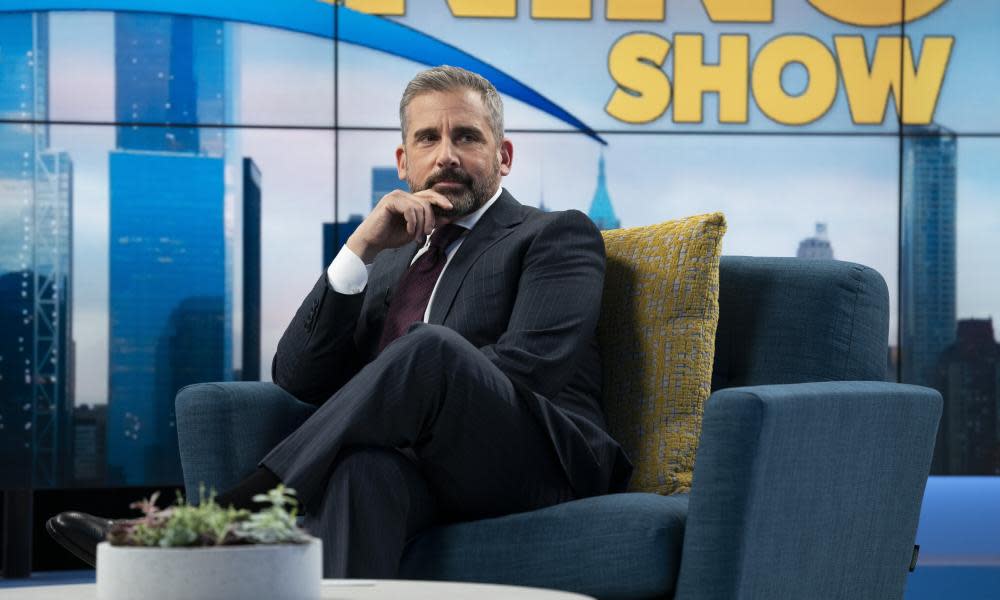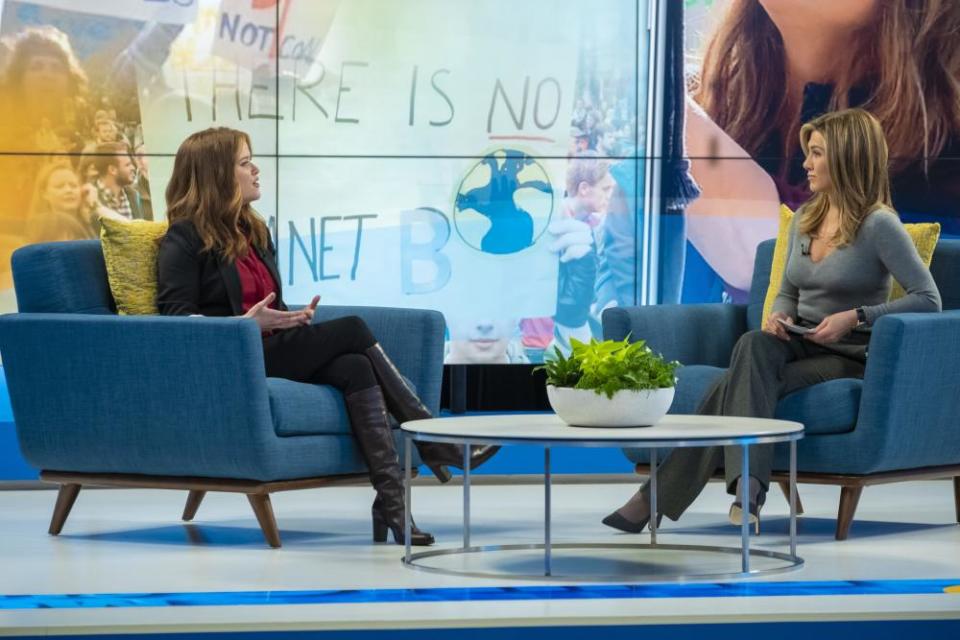The Morning Show: why the messy #MeToo drama is both hit and miss

It takes until over halfway through the second episode of Apple TV+’s The Morning Show – after Jennifer Aniston’s genuinely impressive return to TV as an exposure-steeled morning news anchor, after the reveal of her co-star Reese Witherspoon’s bad brunette wig, after 90 minutes of taking in what an alleged $15m an episode can buy in set design — for me to knee-jerk pause the show.
I needed extra time to ponder a line delivered by Chip Black (Mark Duplass), the fictional Morning Show’s executive producer, who arrives on his #MeToo-deposed former anchor Mitch Kessler’s (Steve Carell) doorstep to beg him to stand down days after his firing. Kessler – clearly based on the former Today show host Matt Lauer and, at this point, fired for undisclosed reports of sexual misconduct – compares the #MeToo movement to McCarthyism, a spineless mob with no regard for his own defense. Fine, Black responds: “I’ll say it – we’re being too fast to judge men in the court of public opinion. I agree with you. The whole #MeToo movement is probably an overcorrection for centuries of bad behavior that more enlightened men like you and me had nothing to do with.”
Related: Apple TV+: should you shell out for the new streaming service?
I hit pause and thought, sincerely: “Oh shit, they really wrote this?” It’s a bold choice for Apple TV+’s marquee original show – a line that seems more like a summary of a certain strain of op-ed than the natural flow of conversation and one impossible to process solely within the world of the show, even if Kessler’s case didn’t overlap so blatantly with Lauer’s. Maybe I was missing something, I wondered; at this point, viewers don’t know the specific allegations against Kessler or anything about the women who made them – what, then, was the point of airing this out? Or of hearing Kessler defiantly declare: “At first they came for the rapists and I did not speak up, because I am not a rapist. And then they came for the powerful men, and you did not speak out, because you are not a powerful man”?

If this is a portrait of male defensiveness and denial in the wake of #MeToo, it’s a messy, haphazard one, somehow both on the nose on what fascinates us and totally obtuse in filtering that toward an insightful end. And yet, I found it impossible to look away. On some level, it’s deeply compelling to imagine what these conversations, between people whose power is far too massive for the vast majority of us to comprehend, look like. The mechanisms and beliefs that protected men like Lauer for years were so obscure or coded that the illusion of getting a glimpse of them in action, even a quasi-fictional one, is seductive. But I think it’s also simpler than that; on a level that’s more instinct than intellect, I just want to see TV grapple with #MeToo directly, in the real world of virality and bad takes, even if it’s messy, even if I frequently pause and shout “NO!” at the dialogue.
Since the New York Times and New Yorker reporting on Harvey Weinstein unleashed the deluge of sexual harassment and abuse stories under the banner of #MeToo, there have been repeated calls for better, less reductive conversations about the movement – a focus on what happens to the women who come forward instead of the toppled men, for example, or a shift from headlines to healing. #MeToo has radically unmasked systems of abusive power in the United States, systems of silence and corrosive protection – especially in the media, where it has done an unprecedented job of removing toxic stars from power, even if their poisonous orbits have, as is becoming clear in books such as She Said and especially Ronan Farrow’s Catch and Kill, remained largely in place.
Thus, if Apple TV+ was going to make a show about the most mainstream of legacy media – the morning network news show – and set it in the year 2019, it was going to have to address the #MeToo landscape, at least obliquely. But The Morning Show goes full throttle on the phenomenon of #MeToo, transparently inspired by the saga at NBC News and Lauer, removed from Today in fall 2017 after an HR report of sexual assault (Farrow later revealed this to be rape), and the question of who knew what and when. This is evident from the first scene in the series, in which Kessler receives a 3am call from Black on his ouster. The subsequent unspooling of events – shocked faces in the office, raw but composed on-air processing by co-star Alex Levy (Aniston), immediate but seemingly surface-level sympathy for the women, Kessler’s scathing denials – align so closely to the world we live in and the media diet of these events that it could almost be the real thing. Except when you sink your teeth into The Morning Show (or, at least, the three episodes available to review), the feel is often cardboard – lines about “this #MeToo moment” and getting pilloried on social or videos called “Mitch Kessler speaks to award-winning director about sexual harassment allegations” feel like they could be said by real people in 2019 but are more signpost than substance. It’s akin to catching your reflection in water: the outlines and features are there but the details are slippery, shifting. You don’t turn here to see the world more clearly.
Related: She Said: an inside look at the story that brought down Harvey Weinstein
And yet, that reflection is still transfixing. The Morning Show can often be frustrating, particularly in its oven-mitt handling of #MeToo, and yet I find it compulsively watchable, even fun. I’m hungry to see these landmark #MeToo events, which I and many others have followed, played out on screen without the often distracting verisimilitude of, say, actors playing Roger Ailes or Gretchen Carlson. It’s baseline compelling to see a story set itself firmly in a world saturated by #MeToo headlines for two years, in part because the movement has supercharged the question of separating art and artist, your complicity in what you view for entertainment. I’m suspicious of my impulse to watch storylines of #MeToo, to be a voyeur to other people’s moral qualms, failings, dilemmas. I wonder if maybe that is part of the problem, harnessing #MeToo for relevance rather than examining it.
And yet, even with the occasionally terrible dialogue, the weird focus on Kessler, a cringey office romance and the incongruence of Reese Witherspoon’s ingenue character, I’m still fascinated by the idea of seeing these #MeToo conversations in progress. Maybe, in time, the $15m spent by the world’s most profitable company will harvest more to say on #MeToo than a loose reflection. But in the meantime, I’m still watching.

